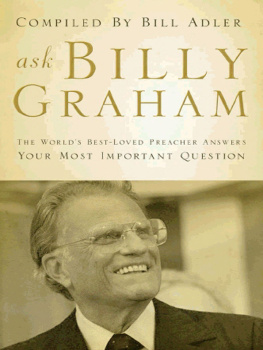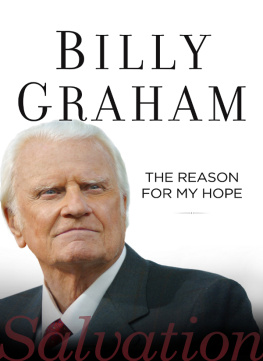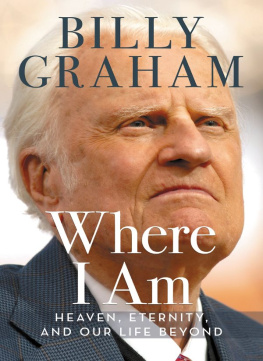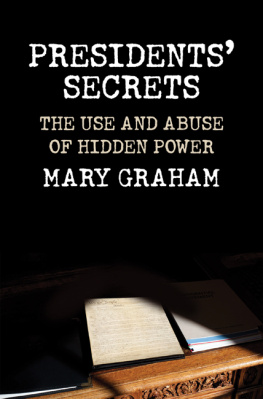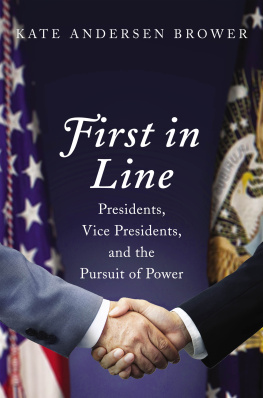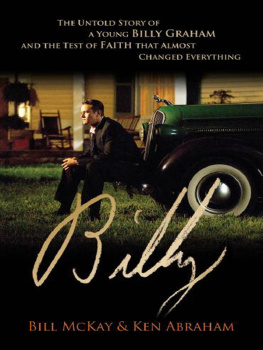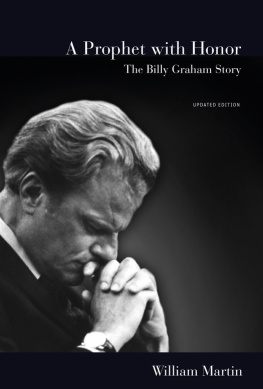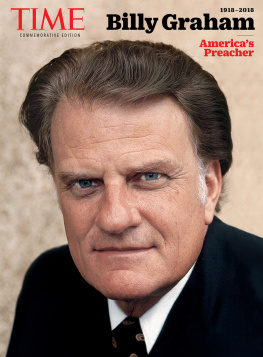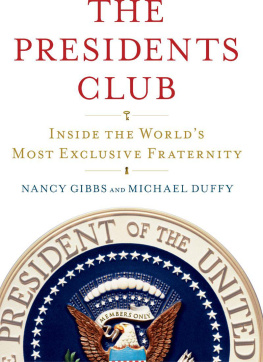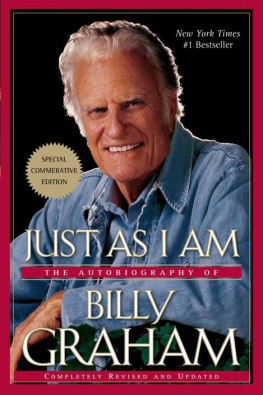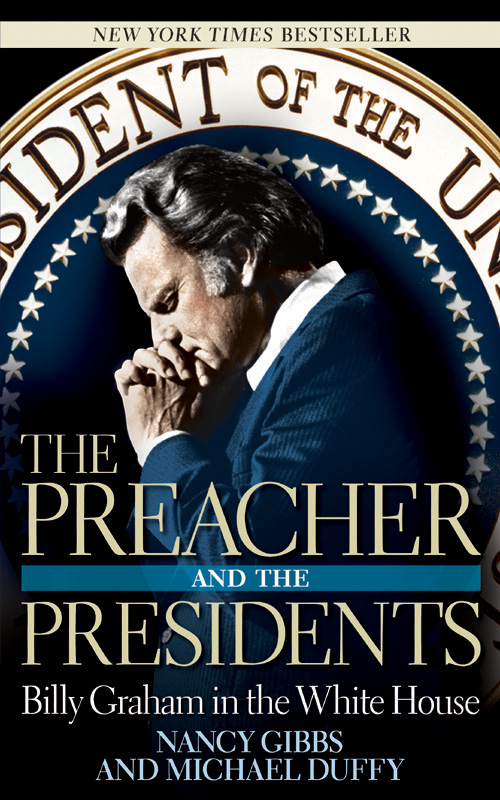Copyright 2007 by Nancy Gibbs and Michael Duffy
Afterword Copyright 2008 by Nancy Gibbs and Michael Duffy
All rights reserved. No part of this book may be reproduced in any form or by any electronic or mechanical means, including information storage and retrieval systems, without permission in writing from the publisher, except by a reviewer who may quote brief passages in a review.
Excerpts from Billy Grahams autobiography, Just As I Am, 1997 by Billy Graham Evangelistic Association. Used with permission of HarperSanFrancisco, a division of HarperCollins Publishers.
Excerpts from Henry Luce Archives, copyright 2007, reprinted with the permission of the trustees of the trusts under Article 14 of the will of Henry R. Luce, as appointed.
Letters from Billy Graham to Henry Luce, 19501960, Billy Graham, used by permission, all rights reserved.
Center Street
Hachette Book Group
237 Park Avenue
New York, NY 10017
Visit our website at www.HachetteBookGroup.com
www.twitter.com/centerstreet
Center Street is a division of Hachette Book Group USA, Inc. The Center Street name and logo are trademarks of Hachette Book Group USA, Inc.
First eBook Edition: March 2010
ISBN: 978-1-59995-038-9
Praise for
THE PREACHER AND THE PRESIDENTS
Nancy Gibbs and Michael Duffys smartly written, thoroughly researched book represents a major advance in our understanding of Graham and, more broadly, religion in modern American political life. The authors, both prize-winning journalists at TIME magazine, not only know how to tell a fast-paced story, but also know how to ask the right questions of the many peopleincluding Graham and former presidentsthey interviewed.
Chicago Tribune
Nancy Gibbs and Michael Duffy, both veterans at TIME magazine, have that peculiar gift among newsmagazine writers for being able to shape masses of complex and contradictory information into a compelling narrative.
Newsweek
THE PREACHER AND THE PRESIDENTS is invaluable.
New York Times
A fresh view on how evangelical Christianity gained such influence in politics.
Washington Post
Gibbs and Duffy maintain a balance between the political and the personal [They] marvelously dramatize Graham and Nixons fraught, intimate relationship.
Publishers Weekly
Long before Jerry Falwell and Pat Robertson roiled politics from the edges, Billy Graham towered over the centers of political and religious power, and presidents genuflected before his influence. THE PREA CHER AND THE PRESIDENTS tells the story that needed to be told and tells it splendidly. Gibbs and Duffy write with a shrewd sense of how politics works, a sure grasp of history, and a genuine appreciation for the power of religious faith.
E. J. Dionne, author of Why Americans Hate Politics
A fascinating book that exposes the many dangers when representatives of the kingdom not of this world become too close to representatives of an earthly kingdom.
Cal Thomas, syndicated columnist
The Lions and the Lamb
M ontreat, North Carolina, is a cove made of rocks and woods tucked at the foot of Greybeard Mountain, where it is easy to feel safe. A tourist who stopped and asked where Billy Graham lived was likely to be told, Gee, I dont really know. But everyone knew. He lived with his wife, Ruth, on the mountaintop, in the house she had built out of pieces of old log cabins more than half a century ago; this was where he came home after his travels, and where in twilight he finally came home to stay.
Maybe everyone needs a sanctuary, a place to find peace, reflect on a life well lived and what lies ahead. But this life was like no other; it was lived, perhaps more than any in modern times or any time, in full view, unguarded. Billy Graham is believed to have spoken face-to-face with more people in more places than anyone in history, having preached the gospel to 210 million people in 185 countries in 417 crusades over the course of more than half a century. Not even Billy Sunday or Dwight L. Moody or any of the great evangelists going back to Saint Paul had spread their message so far; it was Billy Graham alone, inserted into history at just the ripe moment, who became the unrivaled global ambassador for Christ.
His crusades took something out of him. It was not unusual for him to drop fifteen, twenty pounds over the course of several weeks of preaching every night. he told Lyndon Johnson, who was adjusting to postpresidential exile, I jet home to the quietness of this mountain, and for the first few days I hardly know what to do with myself. There even come times of depression. However, that all soon passes.
The road to his house is tight and winding; two cars would have to inhale to pass in opposite directions. On a winter day the clouds hang below the treeline, and the branches stretch old and bony as far as you can see. The final, steep stretch of road ends with a weather-beaten shingle sign reading Private Drive,then chain link topped with barbed wire and a set of automatic iron gates. These were installed in 1968, at the insistence of J. Edgar Hoover, because the death threats were becoming so common, and American icons were being shot that year. Before that the Grahams had been content for protection with signs that said Trespassers will be Eaten.
At the top of the drive is a rain-soaked, brown-logged, stone-and-shingle place that looks like it rose up naturally, as though someone dropped some timber and it grew up to be a house. Theres no sign, no post, no box, no indication that anyone of note lives inside, other than a lot of room for cars and what seems like a lot of dogs.
The first time we visited, we walked in the side door into a long hall that smelled of something we couldnt place, sweet and spicy, not quite dessert, like some kind of perfect incense of home. There were American antiques everywhere, sturdy and hand-hewn and crafted with purpose, thick chairs, a spinning wheel, as well as a Chinese cabinet, porcelains, photos and paintings on the walls, a lifes collection of travels. A lazy Susan table stood in front of the oven in the dark wood kitchen/family room, and cookies and a pie sat on the stovetop. Discreet but central on one wall was a huge flat-screen television, and all the papers lay on the table, not just the New York Times but the London Telegraph. Under the piano in the living room was a big basket of books, with Thomas Friedmans The World Is Flat on top. Over the immense brick fireplace, a mantel had been hewn out of an old diving board, stained dark and etched in German with the message A Mighty Fortress Is Our God.
Billy Graham was sitting in the darkened family room, his walker beside him, and rose slowly to greet his guests. He was frailer than wed expected; he had Parkinsons disease and prostate cancer, and a shunt in his brain to drain the extra fluid. There came a time most days when a powerful pain came over him, a feeling he described as being like an octopus had wrapped itself around him and begun to squeeze. So he timed his visits carefully, to see guests only during his good hours, typically around midday. His eyes were failing: once, many years before, when a mysterious arterial spasm affected his vision, people wrote to Graham headquarters offering to donate their eyes to him. His voice was quiet, sweet in greeting, his manner somehow friendly and courtly at the same time. Im honored youve come, he said, and he suggested, almost urgently, that we go back to his office and get started.


